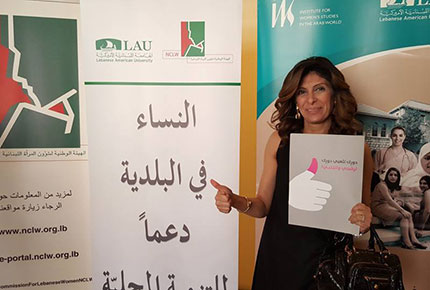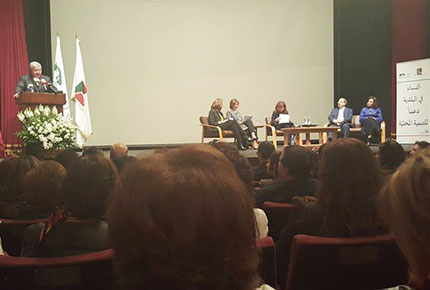We need more women in local governance
The university’s Institute for Women’s Studies in the Arab World hosts a discussion on the representation of women in municipal councils, in collaboration with the National Commission for Lebanese Women.
On the occasion of International Women’s Day, LAU’s Institute for Women’s Studies in the Arab World (IWSAW) hosted a discussion titled “Women in Municipal Councils in Support of Local Development,” in collaboration with the National Commission for Lebanese Women (NCLW). The event proved extremely popular, packing the Irwin Hall Auditorium on the Beirut campus with students, faculty and members of the broader community.
The main issue under discussion was the need to elect more women to municipal councils country-wide, a question made urgent by the impending municipal elections scheduled for May 2016. The positive link between female participation in local governance and development was highlighted early on by Beirut Marathon president and IWSAW board member May El Khalil, who spoke on behalf of LAU President Joseph G. Jabbra. El Khalil’s point was developed further by IWSAW Director Lina Abirafeh, who emphasized a research showing that “more women political leaders means greater prosperity.”
Luca Renda, country director of the United Nations Development Program in Beirut, remarked that while Lebanese women enjoy relatively greater rights and freedoms than their regional counterparts, the country lags behind when it comes to women’s political participation. “Today,” he said, “you have only 5 percent of women in municipal councils, 3 percent in parliament, and 4 percent in the cabinet, which is strange because Lebanon is an open country in so many ways.” The obstacles, noted Renda, are not in legislation or in physical restrictions, but stem rather from social habits and cultural traditions. As such, the UNDP advises Lebanese legislators to approve mandatory quotas for female candidates.
In response to the call for women quotas in the municipal councils, attending Minister of the Interior and Municipalities Nouhad al-Mashnouk declared that such a policy was desirable “but could only be introduced gradually,” and then only as a temporary measure. While admitting that there was indeed “a national need for women’s participation in public life, especially in the area of development,” he added that “the state and men are not responsible” for low female representation as “women have to be convinced both to run and vote.”
Following al-Mashnouk’s speech – which was interrupted by an LAU student lambasting the Ministry of Interior for its handling of protests against the garbage crisis – the event shifted to a roundtable format, moderated by journalist Claude Abou Nader Hindi. The only male participant in the panel, Member of Parliament Ghassan Moukheiber, pointed out that while quotas are in principle a good idea, they will not by themselves resolve the problem.
“The system does not depend on proportionality, this is why women are not participating,” he said. Add to that the political resistance to change in Lebanon. “Politicians will not pass their responsibilities or power to other women, they are not even passing it to other men,” Moukheiber lamented.
While panelist Boushra Itani related her experience as a member of the Beirut Municipality Council, Nada Anid, founding member of “Women in Front” explained how the NGO is actively encouraging and preparing women to run for the upcoming municipal elections through awareness and training.
Wafa’a Dika Hamzeh, a former minister of state and a member of the executive office of NCLW, shared their optimistic view. Even though the May elections are only a few months away, “Lebanon is a country of miracles,” she said. “If we believe in women’s causes and in the importance of participation [in municipal councils] then we can reach our goals.”
Such goals can only be achieved if immediate action is taken, Abirafeh believes. “We must change society, change attitudes, change ourselves to create space for equality… Let us start today to build a world for young women and men – one that is better than our own. Let us commit today to stand on the right side of history – the side of equality.”
This article is part of a series that is published on the occasion of International Women’s Day.
Photos courtesy of Dalati&Nohra
More
Latest Stories
- LAU Kicks off the Seventh Season of the Jr. NBA League
- Bridging Policy, Science and Society to Tackle Lebanon’s Environmental Challenges
- Understanding a Core Security Gap in Drone Operations
- LAU’s AKSOB Hosts a Timely Debate on Digital Banking and the Future of Finance
- LAU Study Maps Antibiotic Resistance in Lebanese Wastewater
- LAU Builds New Bridges to Lifelong Learning
- Monitoring Poverty in a Data-Deprived Environment
- Alumna Lynn Nasr (BArch ’25) Shortlisted Among the World’s Top Architecture Graduates



